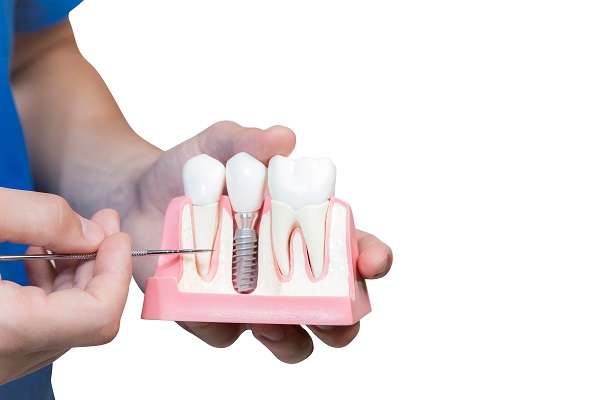Replacing a Missing Tooth with a Single Dental Implant

A general dentist can use a dental implant to replace a missing tooth. It can also be a solution to a failing tooth. This dental restoration is the most secure form of dental replacement. If you want to know more about replacing a lost tooth with a single dental implant, here are the details.
Consequences of a damaged or missing tooth
One missing or damaged tooth can result in multiple problems. Losing a tooth often causes low self-image and depression. A tooth with severe damage can cause intense pain and discomfort. Many people suffer from these dental issues.
A dental gap in the mouth makes chewing and biting challenging. The space leaves the neighboring teeth vulnerable to loosening. The stability for biting and chewing reduces. Teeth tend to shift into the gap. This changes the person’s bite and dental alignment over time.
Severe damage in a tooth results in gum disease. The infection in the tooth spreads to the gums. It can even produce cysts around the tooth. This results in foul breath. Avoiding speaking or even smiling is a common result of losing a tooth, especially in the front part of the mouth.
Bone loss is another problem a dental implant can remedy. Losing a tooth means losing a dental root. This tells the body to stop sending nutrients to that area of the jaw. Tissue repair and cell growth stop because there is no tooth to sustain anymore. This results in bone loss in that section of the jaw.
Replacing a tooth with a single dental implant
There will be a comprehensive consultation first. Then, the general dentist will determine if the patient has significant bone loss in the area of the missing tooth. A bone graft must come first if there is bone loss. This will take at least two months to heal. Only then will the dentist start the dental implant surgery.
The procedure starts by anesthetizing the area of the dental gap. Drilling a dental implant pocket will be next. The general dentist will then place a titanium rod into the implant pocket. Stitching the gum tissue over the rod will keep it in place. This closure will help the rod fuse with the jawbone and gum tissue. Full recovery will take three to six months, depending on the person’s ability to heal.
Regular checkups after the dental implant surgery will allow the general dentist to check the progress of the osseointegration. The complete fusion of the titanium rod, jawbone, and gums will prompt the placement of the abutment. This will be possible by cutting into the implant site again. The dentist will stitch the gum around the base of the abutment. This will heal for about two weeks. Then, the patient will return to the dental clinic for the placement of the custom-fit dental crowns.
A dental implant can replace your missing tooth and improve your oral health
Tooth loss is a common dental problem. Its consequences can affect your oral health and quality of life. A single dental implant can help you regain your lost tooth. It can also bring back the beauty and joy in your smile.
Are you considering getting a dental implant in the Houston area? Get more information at https://www.smilesbycanada.com.
Check out what others are saying about our dental services on Yelp: Dental Implant in Houston, TX.
Recent Posts
Choosing dental implants is a great idea if you are looking into your tooth-replacement options because you are missing one or more of your teeth. This option is one that offers benefits that other replacement options do not, which is why so many patients are choosing implants to replace their missing teeth. Other replacement options…
Most people want to know how dental implants will affect the way they eat and speak. Many individuals would like to know if they would still chew comfortably after getting implants. Some dental implant patients worry that the implants could impact their daily living. If you want to know how eating and speaking would be…
Choosing dental implants is something many people are doing nowadays, as this tooth replacement option is one that offers benefits that no other replacement option can. According to WebMD, there are many advantages to dental implants, including improved appearance, improved speech, improved comfort, improved self-esteem, improved oral health, easier eating increased durability and convenience.Learning how…
Tooth expulsion is not something anyone wants to go through, but thankfully, a dental implant can help with this. Often times, a tooth expulsion occurs due to a traumatic injury to the face or head. With the help of a dental implant, a tooth expulsion can easily be taken care of. Dental implants are one of…


